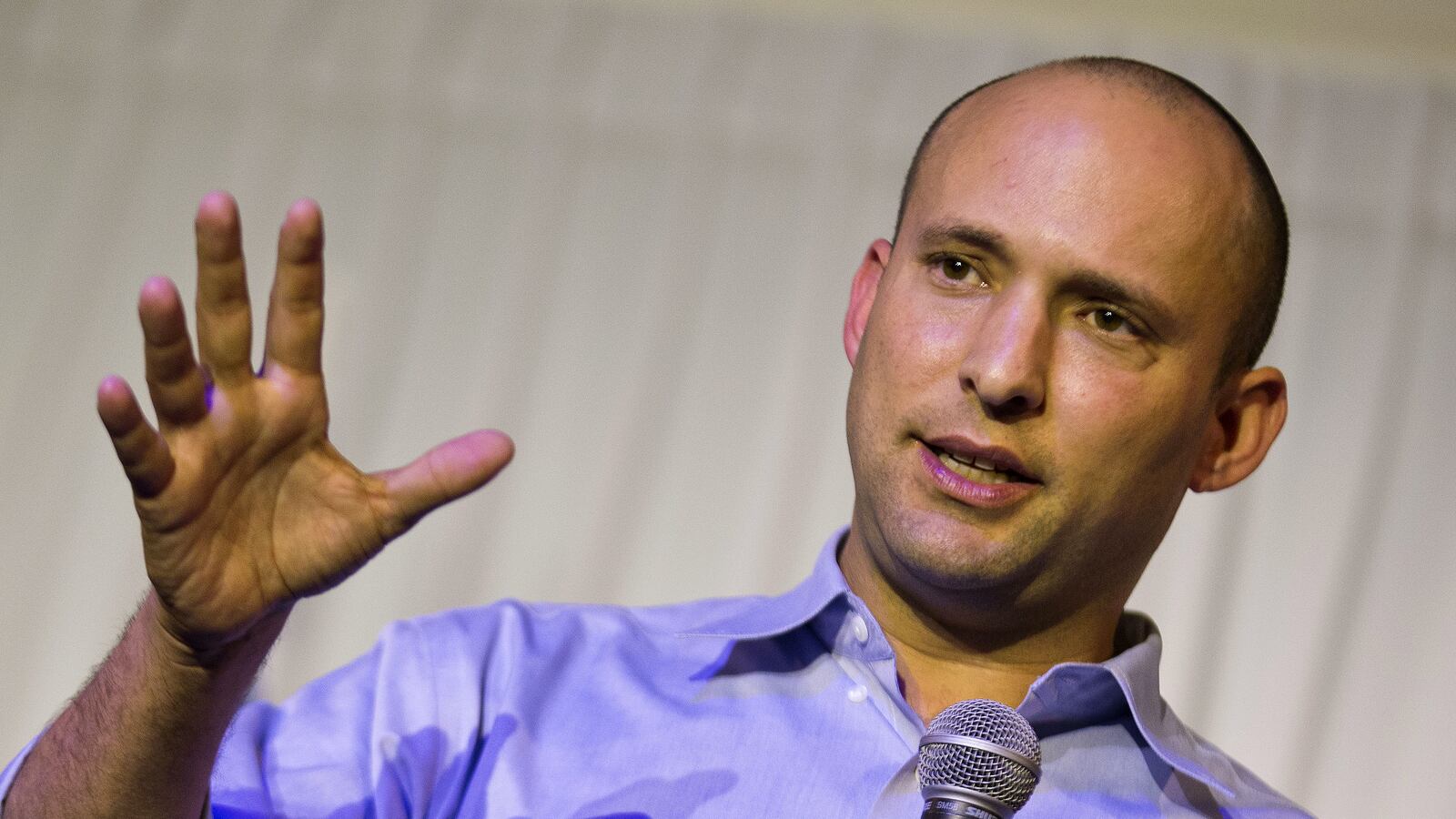In Israel’s crowded political field, one face stands out fresher than the rest: Naftali Bennett. Born to parents from San Francisco, 40-year-old Bennett leads the hawkish HaBayit HaYehudi party (“the Jewish Home”). With Israel’s most successful right-wing immigrant-politician, Moldovan-born Avigdor Lieberman, hindered by growing corruption charges, Bennett will gain. Yet the shift from Lieberman to Bennett is more than a change in personnel—it marks a repackaging of the Israeli far right, with the charismatic and friendly Bennett mixing mainstream appeal with an extreme ideological agenda.

In recent elections, Lieberman was the rising star of the Israeli right, with his Yisrael Beitenu party (“Israeli is our home”) drawing support from rightists and immigrants from the former Soviet Union. Yisrael Beitenu won 11 seats in 2006 and 15 in the 2009 election, making it Israel’s third largest political party. Recent polls indicate that Bennett’s HaBayit HaYehudi could place third in the January 22 elections, potentially with 16 seats. Today, people speak of Bennett as they once did of Lieberman, particularly since the Likud-Yisrael Beitenu unity list has removed Lieberman as a thorn in Prime Minister Benjamin Netanyahu’s right side.
There are other similarities between Lieberman and his newfound rival. Both entered politics as aides to Netanyahu—and both left after disputes with him. Lieberman started working with Netanyahu twenty-five years ago, eventually as General Secretary of Likud and as the Director-General of the Prime Minister’s office until 1997, when policy disagreements drove them apart. Lieberman found his voice as a party leader, expanding beyond his immigrant base by attracting voters disappointed with Likud. Yisrael Beitenu’s fifteen seats gave Lieberman leverage in coalition negotiations with Netanyahu, who appointed Lieberman as Foreign Minister in 2009.
In this election, Naftali Bennett hopes to do the same. Bennett, a wealthy tech entrepreneur, served as Netanyahu’s bureau chief from 2006 to 2008, but unlike Lieberman, has yet to reconcile with his former boss—allegedly due to a vendetta the Prime Minister’s wife has against Bennett. In contrast with Lieberman, who spent years slowly rising in Israeli politics, Bennett—a first time candidate—now may jump straight into the role of high-ranked minister.
Bennett’s rise can be attributed to political talent—but also to luck. The Israeli right is usually politically divided; besides the ultra-Orthodox parties, four parties—Likud, Yisrael Beitenu, National Union, and HaBayit HaYehudi (formerly the National Religious Party)—usually compete for right-wing support. Traditionally, the latter two, aligned with the settler movement, have been marginal players, winning only 3-4 seats. Often led by bearded ideologues, these parties spoke not to average Israelis, but rather primarily to their settler constituencies.
Things have changed. National Union dissolved, with most of its factions joining HaBayit HaYehudi after Bennett won its chairmanship. Meanwhile, Likud and Yisrael Beitenu announced that they would run on a joint list (Likud-Beitenu), with Lieberman serving as Netanyahu’s number two. The decision allowed Lieberman to present himself as a mainstream rather than fringe or “Russian sector” candidate, and has kept his party relevant, even as the case against Lieberman has grown, verging on bribery and costing him the foreign ministry.
With Netanyahu now anchored to Lieberman, the only other significant right-wing party, HaBayit HaYehudi, benefits from their missteps. Meanwhile, Bennett is embracing Lieberman’s former role as Netanyahu’s premier right-wing opponent, while also reaching centrists in ways the gruff, heavy-handed Lieberman never could.
HaBayit HaYehudi has revamped its image, running ads about tradition, renewal at home, and a return to Jewish values—appealing to more moderate voters seeking a visionary leader and willing to overlook the party’s platform extremes in advocating the annexation of most of the West Bank. At the same time, many former Likud and Yisrael Beitenu voters were disappointed with Netanyahu’s speech endorsing a two-state solution and his unwillingness to launch a ground invasion in Gaza. Bennett is waging an unrelenting campaign to win over these voters and turn a marginal settler party into a major force in Israeli politics.
With some center-left parties stating they won’t join Netanyahu’s government, Likud-Beitenu—which is only polling 32-34 seats—may have to rely on HaBayit HaYehudi’s projected 15-16 seats to build a coalition. With that leverage, Bennett could push Netanyahu rightward on settlements and Palestinian affairs, further complicating relations with Europe and America—and surprise voters who, enchanted by Bennett’s feel-good rhetoric, overlooked his harsh views.
In this campaign, Bennett has shown two faces: one ideologically extreme, the other affable and perhaps even inspiring to Israelis jaded by political corruption and stalemate; the latter may well earn HaBayit HaYehudi enough seats to push the next government further rightward. Though a crippled Lieberman is now on his side, Netanyahu may find that his newest rival is even more formidable, elusive, and extreme than his last—and will cause him headaches long after the campaign has ended.






